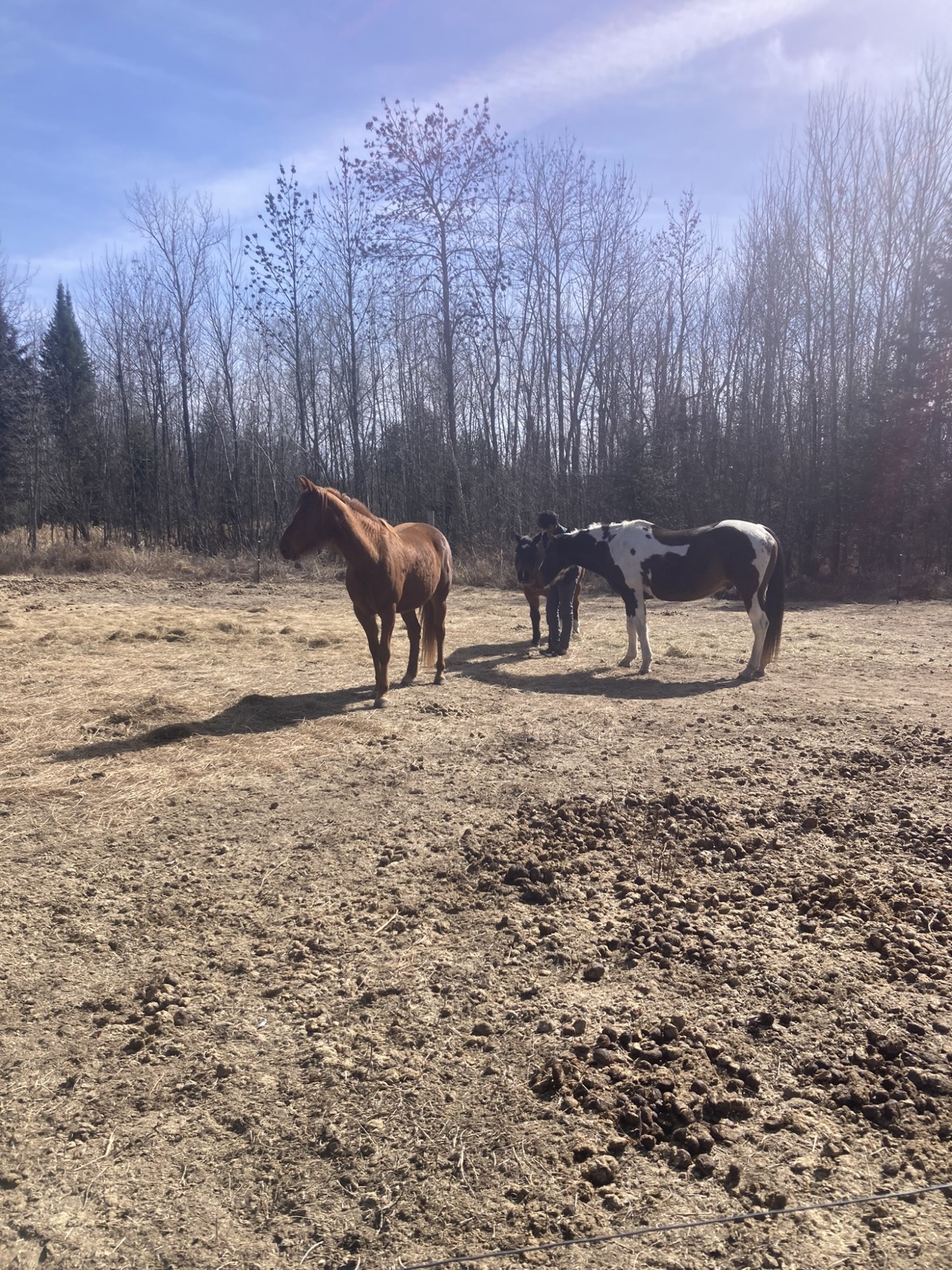Vision Building
This trip arose from 2 years of planning and dreaming. Macalester’s Outing Club planning committee, which I joined in fall 2021, has been creating long term plans in our budget and infrastructure to enable Macalester’s students of color easier access to outdoor spaces in the Twin Cities and beyond as well as opportunities for rest and Indigenous solidarity. As first- year students and with a limited budget, my colleagues and I planned short hikes around the cities, began hosting outdoor skills “101” sessions like camping and making fires, and initiated collaborations with identity collectives like the Latinx Student Union and BIPOC Disability Diaspora Identity Collective. Now as upperclassmen and a dynamic budget, we are able to think bigger and have an even bigger impact.
Also informing my mission with this BIPOC Retreat was my experience on the 2023 Augsburg River Semester. I would be remiss not to mention this incredibly impactful experience which shaped how I want to be a leader and how I want to initiate a sense of belonging and competency in nature. From September to December a group of 16 people and myself traveled down the Mississippi River from Lake Itasca in northern Minnesota to New Orleans, LA, mostly by sailboat, a little by van. We traveled the heartland of America at an excruciatingly slow pace of average 3 miles an hour by boat and camped on the banks of the Mississippi each night. Many of the aspects in the “Soil” section of this essay were practiced intimately on the river.
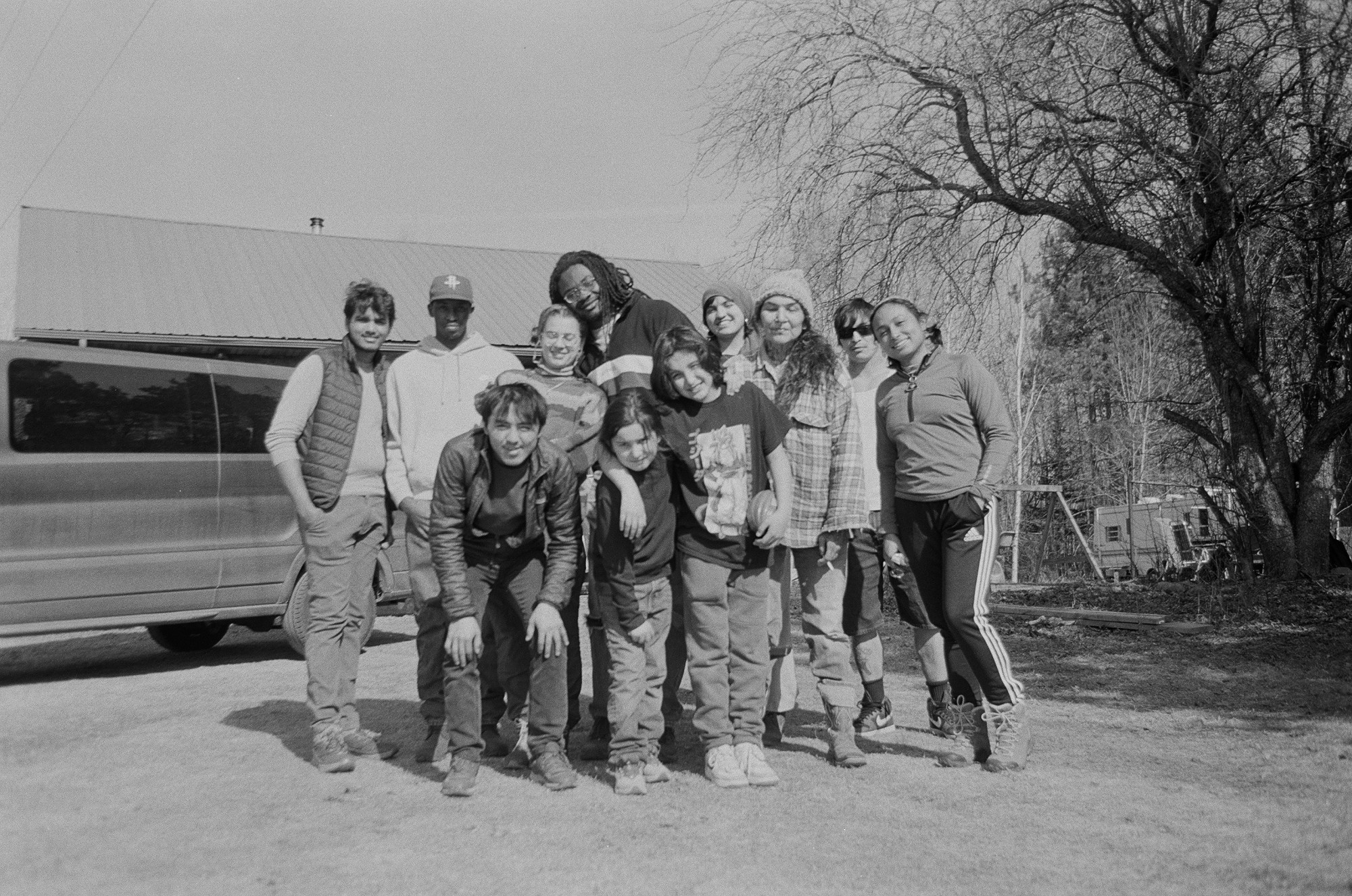
Vision Materialized
For the 2024 BIPOC retreat, I invited folks, drove the van, helped participants get gear, and groceries. Though once we arrived at the Mississippi House in Palisade, Minnesota, we organically moved from one activity guided by Shanai Matteson and her kids to another. There wasn’t really “programming” rather it felt like we were welcomed into Shanai’s home for meals, a walk to the river, and bonfires. In the time we spent with her, we learned aboutgleaned the recent and ongoing history of the Line 3 oil pipeline construction bordering their property, and Talon Mine’s proposed nickel and copper mine construction. The path we walked from the river to the road traced the horrific scar on the land left by the construction of the Line 3 oil pipeline. While the wound was palpable, even in the gray hues and dryness of winter, we witnessed countless wildflower and prairie plants that had established themselves.
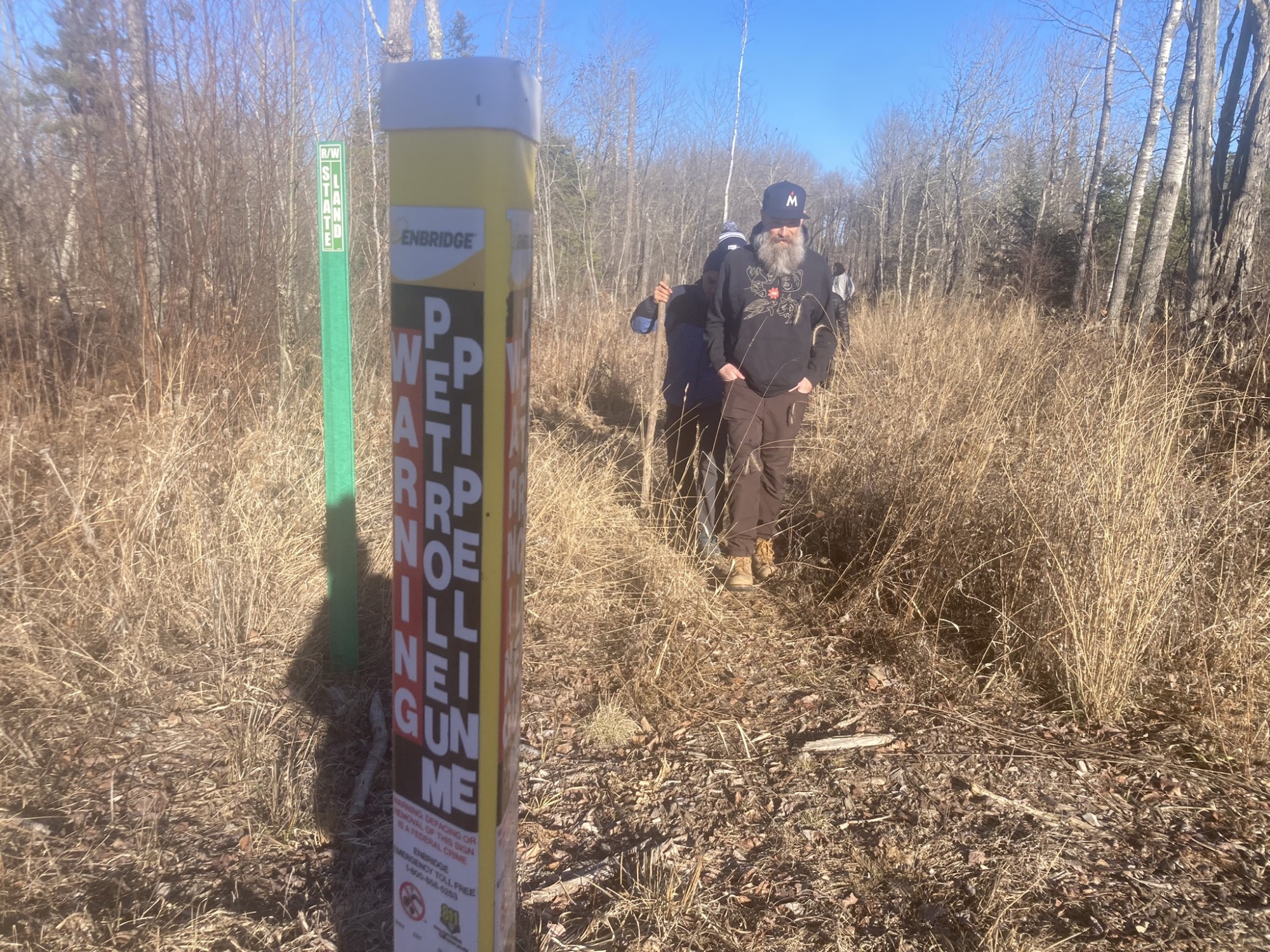
Prioritizing Well-Being is Radical
Reflecting on the mental health needs of participants and activists, this retreat embodied many practices vital for enhancing resilience, inspiration, and energy. The trip was crafted to support work that is often physically and emotionally demanding.
Many of the practices on this retreat were informed by the course "Mental Health and Well Being in US Schools" with Professor Tina Kruse. This course not only highlighted essential mental health practices but also provided practical experiences that shaped the intentions of our trip. The retreat took place over four days, immersing us in nature and allowing for deep social connection as we lived, ate, and played together. Key mental health practices we focused on during the course were seamlessly integrated into our experience on the retreat. These included social connection, expressing gratitude, physical exercise, creating art, laughter and play, positive nostalgia, and activism.
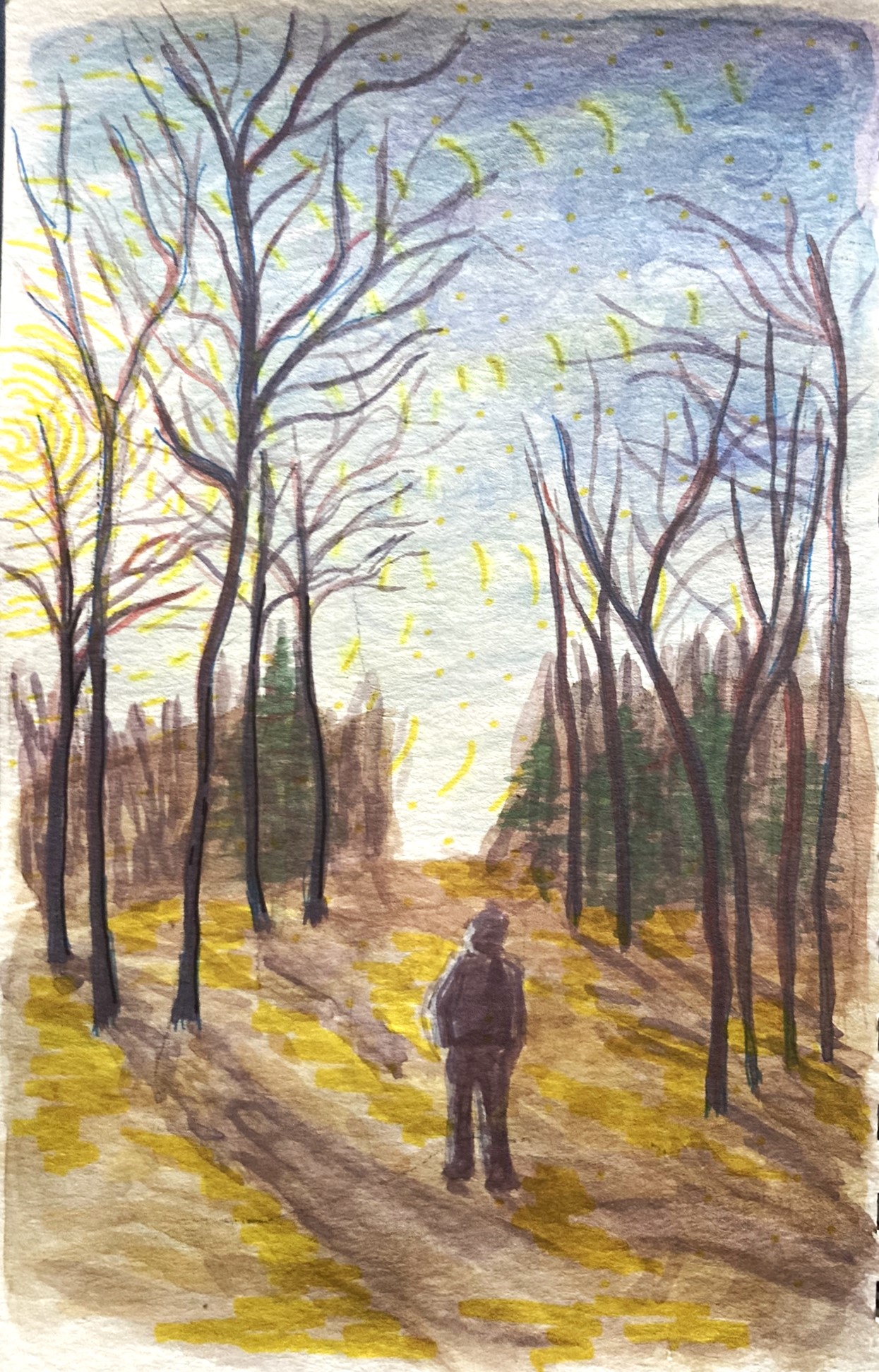
Some practices were woven into our daily activities, like social connection through shared meals and camping, and physical exercise through outdoor activities. Annie Humphrey introduced less obvious practices, like discussions about childhood and gratitude, which enriched our experience. One evening, positive nostalgia played a significant role when each person shared their relationship to the land, their identity as a person of color, and their journey as an activist. These conversations, filled with gratitude and sorrow, led to emotional bonding moments of crying and hugging, deepening our connections.
Reflection from a participant:
“When Annie asked about everyone’s upbringing that caught me off guard, I am not used to people 1) asking personal questions casually and 2) caring about the response. This was super refreshing and has encouraged me to ask more questions that 'push the boundaries' about what is socially acceptable or normal. And then, everyone answering honestly in-depth was also super refreshing and showed me that it’s not weird or unwarranted to give people real responses to questions like "how are you doing" and you get to have real conversations with people when you both ask and answer genuinely. I am now craving more 'real' interactions with people. Thanks to the retreat, I know that people are out there willing to have these experiences too and that I can be the person to initiate it.”
Art-making was another central aspect of the retreat. At the Mississippi House, a print studio in the garage and personal art supplies brought by participants facilitated creativity. One night around the bonfire, a guest provided handmade drums, and I played beats that resonated deeply while we chatted under the stars. Another evening at Annie’s house, we gathered in the music room with guitars, tambourines, harmonicas, and drums. We sang together for hours, while Annie offered stick-and-poke tattoos and others played board games. This atmosphere was incredibly rejuvenating, as we soaked in each other’s energy in a beautiful, intimate, and caring way.
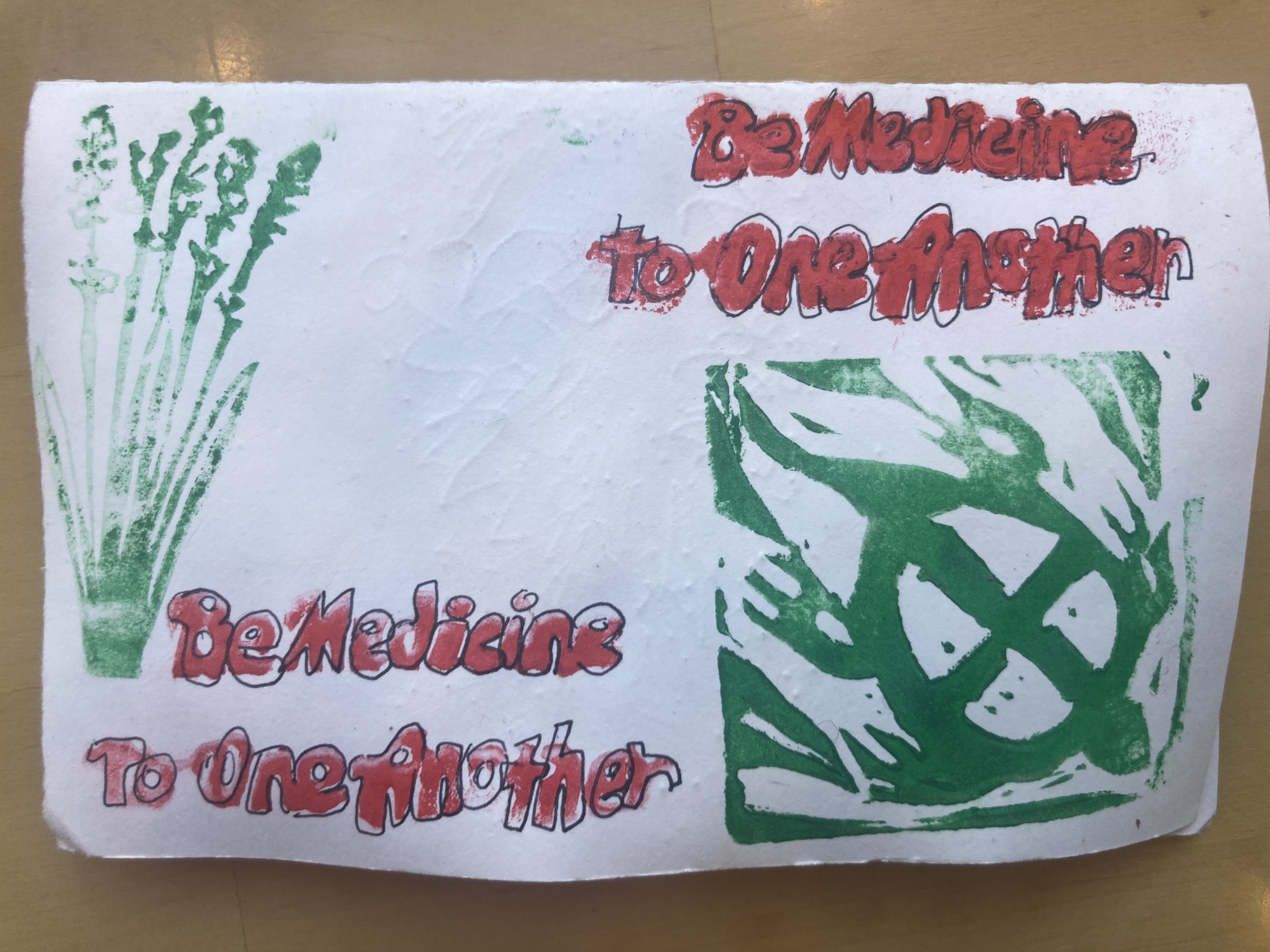
Initially, the benefits of this trip to our bodies, souls, and relationships seemed obvious. However, reflecting on the specific mental health practices we engaged in, especially those learned in Professor Kruse’s course, I now see how these experiences resonated with what we studied this semester. I can envision integrating these practices into various contexts to support the mental health of activists in outdoor spaces.
Soil
In this section resides the seeds of themes, ideas, intentions from which our experiences were rooted and subsequently sprouted. While these themes were easy to identify after the fact for participants, these intentions informed the way I showed up as a leader and attempted to co-establish group norms.
• NOT IN A RUSH We have places to be, transition to the next activity, relax into the rhythm of the group and we will end up where we need to be.
• If you want to lose control, plan a trip with 7 autonomous adults, control will be relinquished soon.
• Multi-generational spaces Children and elders are essential to movement spaces!! They seem to not be so caught up in our stressors like work and school; they provide comedic relief, they give us PERMISSION to play, to laugh!
• Commune around food, cooking and eating- When we share meals together, our defenses naturally diminish, you must be relaxed to DIGEST.
• Lead leaderful groups! NOTHING IS DONE INDEPENDENTLY. Help folks share co-ownership and a vision of the mission.
• Skill building land-based experiential education for college students: Building competency; Engaging with meaningful issues around water, food, land access, extraction, racial tensions; Remain teachable always. All ages are good students.
• Bring and receive gifts as visitors wherever you go and from whomever you meet - herbs, medicine, seeds, art, food, hugs, blessings, lessons. Can we give as much as we are receiving? Not necessarily in money and transaction terms.
• RURAL literacy and compassion BIPOC folks belong everywhere. Rural areas and urban alike. Rural communities are often overlooked and neglected or seen as uninviting to us.
• MUSIC ART PLAY are invaluable tools of connection
• Vulnerability leads to Safety leads to Freedom leads to Exploration leads to Connection
• Deep care for the earth and each other
Future Seeds and Fires
Annie Humphrey, our host at her farm on Leech Lake Reservation, fed our fires. She asked us all questions that led to hours and hours of talking and listening around fire, food, tea, music, and games over the weekend. The group was small and everyone had a lot of space to do a lot of everything. I was so impressed with how open and vulnerable everyone arrived in the space. I think part of this was because everyone knew at least one person and half of the group were friends I had invited. Yet, folks really trusted the space and were so gracious in how they received each other and shared really intimate parts of themselves.
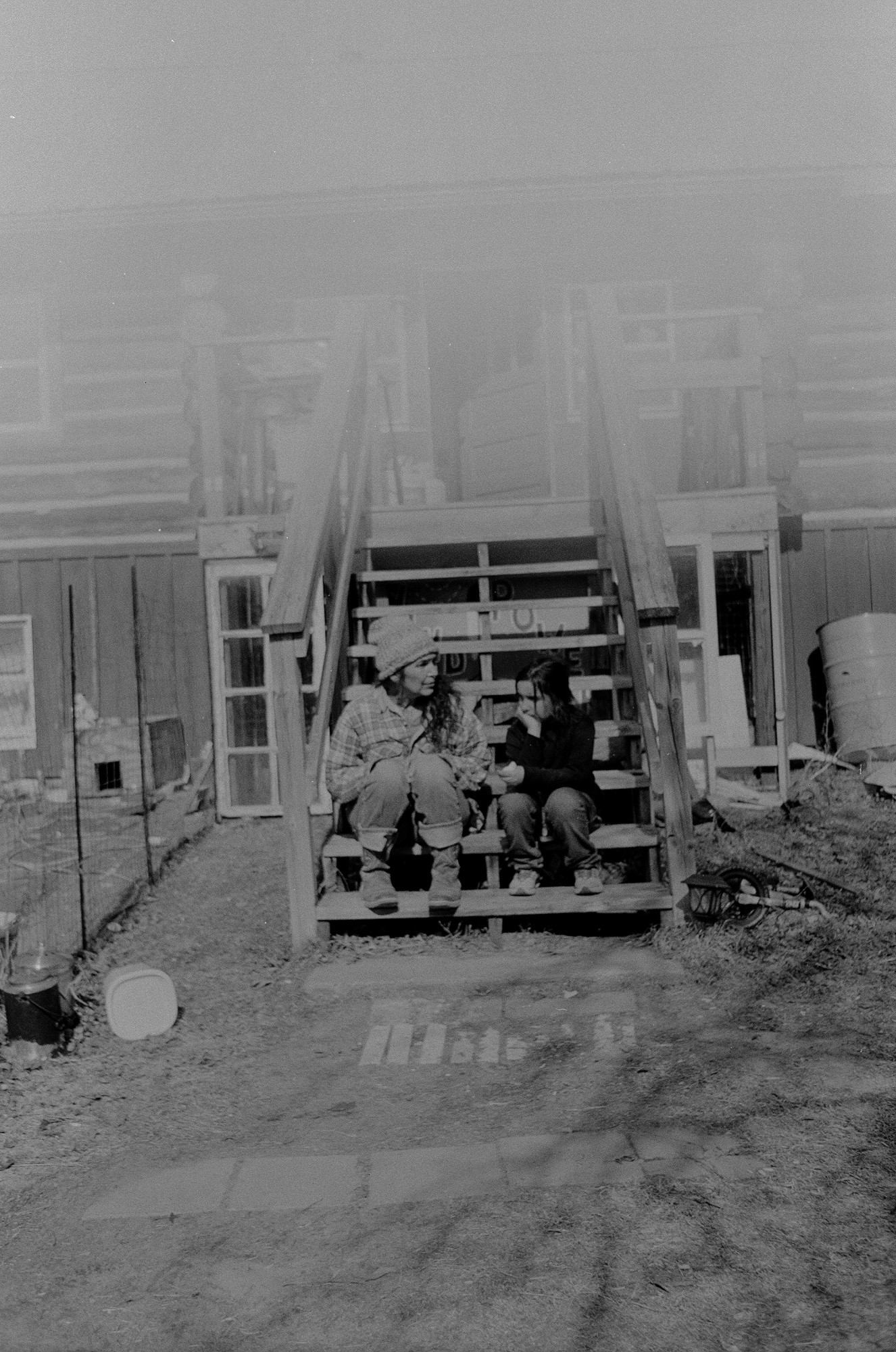
Some prompts to get folks talking, adapted from Annie’s questions:
What brought you here? What’s your story?
Get some quote cards! Each person shares a quote, and explains how it resonates.
Or use those “We’re Not Really Strangers” cards.
Give the person to your left a compliment!
Give the opportunity to share stories. Maybe use some prompts depending on the readiness of the group.
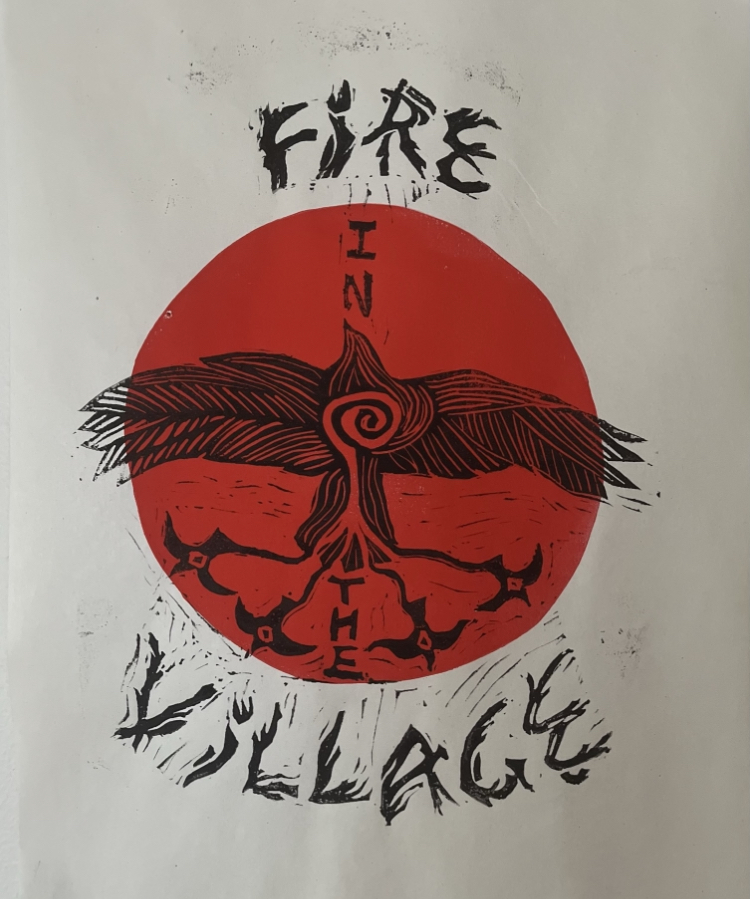
Reflections from Participants
“Thank you so much Annie and Shanai for opening your homes and sharing your wisdom and energy with the group. It’s the first time I've had an opportunity to connect with land in this way in my 20 years of life and it's something I want to continue forever. I never thought of myself as a camper or someone outdoorsy and now my perspective on that is forever changed.”
“One of the trip planners' strengths lies in their ability to cultivate a harmonious atmosphere where individuals from diverse backgrounds can connect. They excel at discerning the unique energies each person brings and strategically bringing together those who complement one another. Their capacity to recognize and appreciate the beauty and strengths of others, and to unite like-minded individuals who share a common vision for people, the land, and humanity, is truly admirable. Additionally, the thoughtful gesture of hosting a welcome dinner fosters genuine connections by allowing participants to quickly transcend surface-level interactions and understand one another's backgrounds. Furthermore, they exhibit exceptional care and consideration for people's boundaries, allergies, health needs, and other personal preferences, ensuring that everyone feels respected and accommodated throughout the journey.”
“As an international student being in the US for the first time, this trip was eye-opening and mind blowing. It gave me an opportunity to learn more about the history, culture and the people of this land. I felt close, amused, shocked, sad, happy, excited, inspired - so many emotions at the same time! This trip has a very deep impact on me, especially the deep relationships I've formed with the people. Beyond learning so much, I've met so many interesting & inspiring people. Shanai's activism stories, Annie's husband's horse, the kids' sheer energy, Annie's lifestyle, bonding with my fellow participants - all these made this experience so wholesome! I'm very grateful to have participated in this trip - thank you so much.”
Compost
This trip was so exhausting for me. I wanted to lead a trip like this so badly even though my usual co-conspirator and friend Francesca is studying abroad, there were numerous obstacles, and I was busy and tired from school. I needed a break and a retreat too. When I asked everyone to share what it meant to them on the drive back, it made all the work so worth it. I’m writing this a few days after returning, I am filled to the brim with gratitude, with fire Annie brewed in us; yet I’m also so depleted. Absolutely this trip will be an annual thing, maybe a few times a year. I will be involved with many of these same themes in the future in all the work I do. However, as I live up to all of the intentions in “Soil” I will prioritize going far and sustaining my energy rather than going fast and believing I can do it all myself.
💩This compost will be turned and what becomes recycled will aid new life. 💩
Permission Poem
Write a thank you letter
Just help others
Be the medicine to one another
Start a FIRE in the village
I go fast, but WE go far
Fight for rural communities
Save your seeds and share them.
